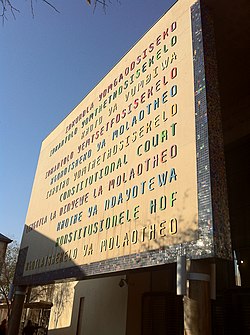Unfair discrimination
The Constitutional Court's majority judgment was written by Justice Richard Goldstone, who overturned the Supreme Court's finding and upheld the President's appeal. His judgment opened with an exposition of the constitutional right to equality, including an oft-cited description of the purpose of the section 8(2) protection from unfair discrimination:
The prohibition on unfair discrimination in the interim Constitution seeks not only to avoid discrimination against people who are members of disadvantaged groups. It seeks more than that. At the heart of the prohibition of unfair discrimination lies a recognition that the purpose of our new constitutional and democratic order is the establishment of a society in which all human beings will be accorded equal dignity and respect regardless of their membership of particular groups. The achievement of such a society in the context of our deeply inegalitarian past will not be easy, but that that is the goal of the Constitution should not be forgotten or overlooked.
Thus, though men were not a disadvantaged group, they could nonetheless be victims of unfair sex discrimination. Indeed, the majority judgment agreed with the court a quo that the Presidential Act did discriminate against male prisoners – in fact, discrimination was inevitable in such a directive, because, "The line has to be drawn somewhere, and there will always be people on one side of the line who do not benefit and whose positions are not significantly different to those of persons on the other side of the line who do benefit." Moreover, because the Presidential Act discriminated on the ground of gender, section 8(4) of the Interim Constitution entailed that such discrimination was presumptively unfair unless the contrary was proved in court. Goldstone held that:
To determine whether that impact was unfair it is necessary to look not only at the group who has been disadvantaged but at the nature of the power in terms of which the discrimination was effected and, also at the nature of the interests which have been affected by the discrimination.
He concluded that the President had indeed proved that the discrimination was not unfair in these terms. In particular, the public interest and the administration of justice required that the scope of the presidential remission must be limited. Male prisoners outnumbered female prisoners almost fiftyfold, so the release of imprisoned fathers would mean the release of a very large number of prisoners. Moreover, the President had intended for the remission to serve the interests of children, and, because men were generally not their children's primary caretakers, the release of male prisoners "would not have contributed as significantly" to the achievement of this purpose as the release of mothers had. Finally, the impact of the discrimination on imprisoned male fathers was not severe: "The Presidential Act may have denied them an opportunity it afforded women, but it cannot be said that it fundamentally impaired their rights of dignity or sense of equal worth." Thus the Presidential Act was not unfairly discriminatory and Hugo had no justified complaint under section 8(2) of the Constitution.
Presidential prerogatives
Goldstone's judgment was also notable for its defence of the applicability of judicial review to the exercise of a presidential prerogative. The section 82(1)(k) power to pardon offenders was one of a list of powers granted by the Interim Constitution to the President in his capacity as head of state (rather than head of the executive). Like the others, it was historically a prerogative power of the English monarch. Goldstone found that, under South Africa's new constitutional dispensation, such prerogative powers flow directly from the Constitution and constitute executive powers – that is, their exercise constitutes an exercise of executive authority. Under constitutional supremacy, the court therefore had jurisdiction to review the exercise of any presidential power under section 82(1), and such exercise must comply with the Constitution and the Bill of Rights.
